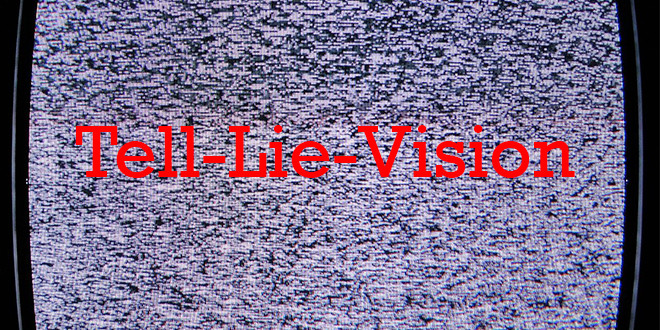By Sam Chaney | WeaponizedNews.Com
The two way telescreen from George Orwell’s 1984 allowed Big Brother to both transmit and receive information. Today in 2015, we have those same telescreens being sold to us as Smart Television (SmartTV). In the Samsung Global Privacy Policy – SmartTV Supplement it states, “We collect, use, share, and store information through your SmartTV in the ways described in the Samsung Privacy Policy.” Samsung also admits its SmartTV allows third party access to collect, receive and record your information saying, “Please be aware that if your spoken words include personal or other sensitive information, that information will be among the data captured and transmitted to a third party through your use of Voice Recognition.”
TV is a technotronic weapon used to control your mind. Developing children are especially vulnerable to reduced brain function caused by TV. Research shows watching too much TV (including Movies, TV Shows and Video Games) can hinder brain functions, education, health, behavior and social interactions. The shocking data below from the Fort Dodge Community Foundation and United Way exposes precisely how dreadful TV really is for your mind, body and soul.
TV’s Impact on the Brain
- Watching TV puts the brain into an Alpha state (which is linked to relaxed states, meditation, and increased suggestibility), meaning it is basically in a state similar to hypnosis. By watching TV, we are put into a form of ‘mind fog’, which is just blank and empty nothingness. Researchers have said that watching television is similar to staring at a blank wall for several hours.
- Television is actually a series of rapid images—opposed to an unbroken stream—which is what causes our brains to enter into this Alpha state and continues to draw our attention to the screen.
- By turning the television off and reading instead, our brains enter into a Beta state, which is linked to logical and critical thinking.
TV’s Impact on Education
- Excessive TV can contribute to poor grades, behavior problems, and risky behavior.
- An Iowa State University study found that kids who watch TV more than 2 hours each day are more likely to be diagnosed with attention problems like ADHD/ADD.
- Exposing kids to TV before the age of 2 can cause expressive language delays and possible developmental problems.
- Too much television can result in language delays and smaller vocabularies—language skills that are best developed by reading and interacting with others in conversation or play. Excessive TV can impede this development because it does not talk back in a genuine way.
- TV can discourage and replace reading, which requires much more thinking than television and plays a crucial role in development. Kids from families that have the TV on a lot spend less time reading and being read to, and are therefore less likely to be able to read.
- One research study found that watching too much TV had long-term effects. The study showed that watching TV as a child affects educational achievement at age 26. Watching more TV in childhood increases the chances of dropping out of school and decreases the chances of getting a college degree.
TV’s Impact on Behavior and Violence
- 2/3 of all programming contains violence.
- Programs designed for children contain violence more often than adult TV.
- Television promotes violent acts as a fun and effective way to get what you want without consequences, even for good guys.
- Most children’s programming doesn’t teach what parents say they want their children to learn; instead it is filled with stereotypes, violent solutions to problems, and mean behavior.
- Kids see their favorite characters smoking, drinking, and involved in sexual situations and other risky behaviors in shows and movies on TV.
- Every single American animated feature film produced between 1937 and 1999 contained violence.
- The average American child will see 200,000 violent acts and 16,000 murders on TV by age 18.
- Children imitate the violence they see on TV. Many times, they will try to be like their “good guy” heroes. Because of this, watching television contributes to more violent and aggressive behavior.
- Watching TV at age four was found to be associated with bullying in grade school.
Impact on Health and Fitness
- For every hour that kids watch TV, their chance of developing depressive symptoms increases by about 8 percent.
- In the long term, the more TV you watch, the unhappier you are, regardless of education, income, age, and marital status.
- Infants and toddlers who watch TV have more irregular sleep schedules and can also experience disrupted sleep patterns.
- Teens who watched three or more hours of TV per day had a higher risk of sleep problems by early adulthood.
- Watching television is a major cause of obesity.
- Children who watch TV are less likely to engage in physical activity, and this inactivity is a huge factor in weight gain. TV watching consumes only a few more calories than sleeping.
- While watching TV, our metabolic rates seem to go even slower than during rest.
- A University of Michigan study found that just being awake and in the room with the TV on for more than 2 hours a day is a risk factor for being overweight at ages 3 and 4 and a half. This can carry on into adult weight problems as well.
- Results from recent studies have reported success in reducing excess weight gain in preadolescents by restricting TV viewing.
- University of Michigan researchers found that among 3 to 7-year-olds, TV was a bigger factor than diet in being overweight.
- Many TV ads encourage unhealthy eating habits—2/3 of the 20,000 commercials a child sees each year are for food, most of which are high-sugar. Children are more likely to snack while watching TV.
Additional General Statistics
- The American Academy of Pediatrics (AAP) recommends that children under the age of 2 don’t watch any television at all.
- France has banned TV shows that are aimed at kids under 3, due to concern about the negative impact.
- Many of the programs for kids under 2 are simply used to market toys, games, dolls, and unhealthy food.
- On average, children ages 2-5 spend 32 hours a week watching TV, movies, or playing games. Ages 6-11 spend about 28 hours per week.
- Kids with a TV in their bedroom spend an average of almost 1.5 hours more per day watching TV than kids without a TV in the bedroom.
Television takes away from so many other activities that are beneficial and even crucial for kids. The more time they spend in front of a screen gaming or watching shows, the less time they spend:
- Playing outside with friends
- Reading
- Participating in sports, music, art, and other activities that require practice to become skilled
- Being physically active
- Getting fresh air
- Using their imaginations
- Doing homework
- Doing chores
- Interacting with family members
Not all television is bad, and watching it in moderation can even be beneficial to children. When used in excess, however, television can lead to numerous problems and missed opportunities that affect not only childhood but later life as well. Of course, the responsibility to monitor and limit children’s television falls to parents.
Here are some tips on how to treat TV in your home and some activities you can use to replace it:
- Make specific rules about when your children can and can’t watch TV. Don’t allow it during meals, homework, or when you aren’t around.
- AAP Guidelines recommend that parents limit TV watching to 1-2 hours per day at most.
- Another option is to limit TV to one hour on school nights and 2-3 on weekends.
- You may allow extra viewing time for special educational programs.
- Make it a rule that kids must have finished their homework before watching TV. Record shows that are on earlier for them to watch later.
- Playing video games too much can be just as bad, if not worse, than watching excessive TV. Limit these games the same that you would television shows—if you decide on two hours of TV each day, gaming should be included in this time.
- If your child is doing poorly in school, consider limiting TV to half an hour each day or less. However, make sure this is not treated like punishment. You simply want to help him achieve his best in school.
- Don’t use TV as a reward or punishment. This gives it too much value, and it takes away value from what kids had to do to earn TV time.
- Review and monitor the shows your children watch. Try to find educational programs that will teach and help rather than harm them. Don’t allow them to watch inappropriate shows or movies that are too mature for them. Even a lot of children’s programming contains things that kids shouldn’t see.
- Don’t leave the TV on as background noise.
- Keep TV off during mealtimes—research shows that eating while watching TV has an even worse effect of “hooking” children.
- Make conversation a priority. This will improve your relationship with your kids and improve their conversational skills.
- Do not put televisions in your children’s bedrooms. You can’t monitor them there, and having a TV in the bedroom is linked to sleep problems and doing worse in school. Kids with TVs in their room watch an average of 1.5 more hours each day. If your kids complain that all their friends get one, just say you’re doing what’s best for them because you care.
- Model the correct behavior—don’t tell your kids they can’t watch TV while you watch your favorite programs for hours right in front of them.
- Let your kids see that you enjoy reading rather than watching TV.
- Don’t use TV as a distraction or baby-sitter for preschool children. Have your kids “help” you with work you have to get done. When you do bills, give them paper to draw and color on while they sit near you. When you do laundry, have them help fold socks or sort by color. Also have them help with dinner rather than watching TV.
- There are numerous other alternatives to TV: puzzles, play dough, board games, crayons, magazines, cutting and pasting, dress-up, reading, and making forts.
- Encourage your kids to take part in sports, games, hobbies, and music. Turn off the TV and take a walk or do a project with your child.
- Designate a certain evening for special family activities like family bike rides or game nights.
Sources:
http://www.samsung.com/uk/info/privacy-SmartTV.html
http://www.infowars.com/samsung-smart-tv-records-personal-conversations-sends-them-to-third-parties/
http://fd-foundation.org/cms-view-page.php?page=educational-resources
http://unitedwayfd.org/reading-view-page.php?page=effects-on-reading
http://med.umich.edu/yourchild/topics/tv.htm
http://psybites.wordpress.com/2013/02/22/its-time-to-switch-off-your-tv/
 Weaponized News New World Order politics, economics and current events
Weaponized News New World Order politics, economics and current events







